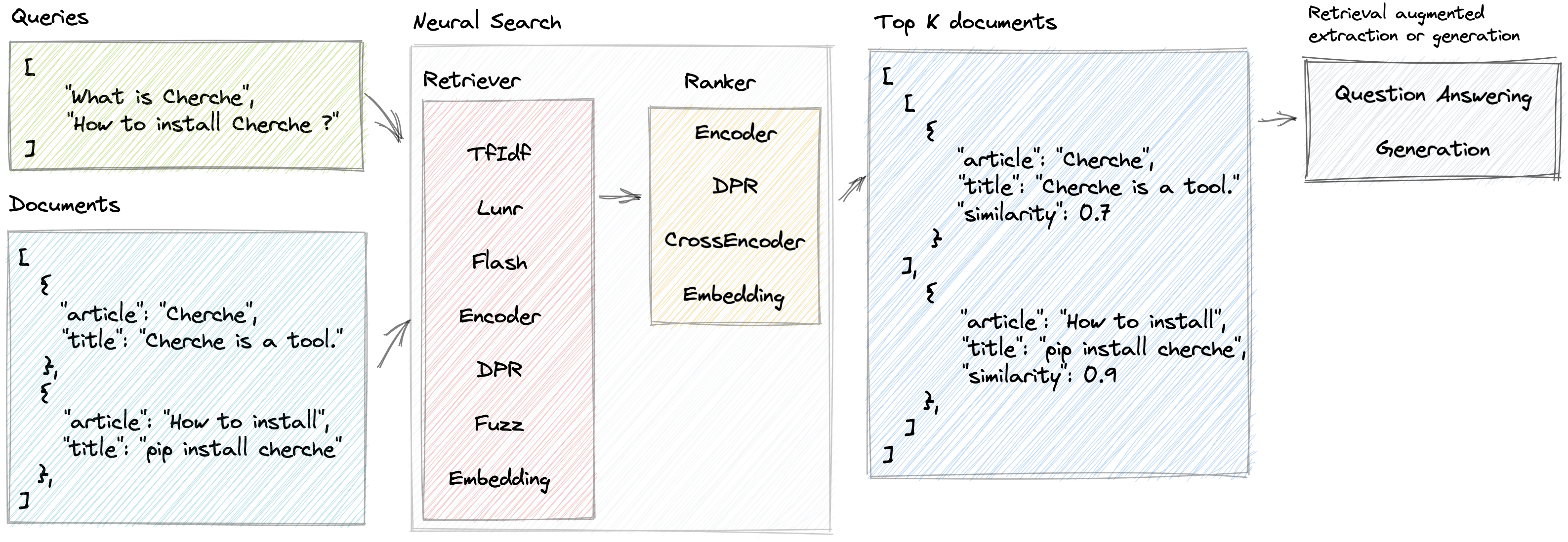Neural search

Cherche enables the development of a neural search pipeline that employs retrievers and pre-trained language models both as retrievers and rankers. The primary advantage of Cherche lies in its capacity to construct end-to-end pipelines. Additionally, Cherche is well-suited for offline semantic search due to its compatibility with batch computation.
Here are some of the features Cherche offers:
Live demo of a NLP search engine powered by Cherche

To install Cherche for use with a simple retriever on CPU, such as TfIdf, Flash, Lunr, Fuzz, use the following command:
pip install chercheTo install Cherche for use with any semantic retriever or ranker on CPU, use the following command:
pip install "cherche[cpu]"Finally, if you plan to use any semantic retriever or ranker on GPU, use the following command:
pip install "cherche[gpu]"By following these installation instructions, you will be able to use Cherche with the appropriate requirements for your needs.
Documentation is available here. It provides details about retrievers, rankers, pipelines and examples.
Cherche allows findings the right document within a list of objects. Here is an example of a corpus.
from cherche import data
documents = data.load_towns()
documents[:3]
[{'id': 0,
'title': 'Paris',
'url': 'https://en.wikipedia.org/wiki/Paris',
'article': 'Paris is the capital and most populous city of France.'},
{'id': 1,
'title': 'Paris',
'url': 'https://en.wikipedia.org/wiki/Paris',
'article': "Since the 17th century, Paris has been one of Europe's major centres of science, and arts."},
{'id': 2,
'title': 'Paris',
'url': 'https://en.wikipedia.org/wiki/Paris',
'article': 'The City of Paris is the centre and seat of government of the region and province of Île-de-France.'
}]Here is an example of a neural search pipeline composed of a TF-IDF that quickly retrieves documents, followed by a ranking model. The ranking model sorts the documents produced by the retriever based on the semantic similarity between the query and the documents. We can call the pipeline using a list of queries and get relevant documents for each query.
from cherche import data, retrieve, rank
from sentence_transformers import SentenceTransformer
from lenlp import sparse
# List of dicts
documents = data.load_towns()
# Retrieve on fields title and article
retriever = retrieve.BM25(
key="id",
on=["title", "article"],
documents=documents,
k=30
)
# Rank on fields title and article
ranker = rank.Encoder(
key = "id",
on = ["title", "article"],
encoder = SentenceTransformer("sentence-transformers/all-mpnet-base-v2").encode,
k = 3,
)
# Pipeline creation
search = retriever + ranker
search.add(documents=documents)
# Search documents for 3 queries.
search(["Bordeaux", "Paris", "Toulouse"])
[[{'id': 57, 'similarity': 0.69513524},
{'id': 63, 'similarity': 0.6214994},
{'id': 65, 'similarity': 0.61809087}],
[{'id': 16, 'similarity': 0.59158516},
{'id': 0, 'similarity': 0.58217555},
{'id': 1, 'similarity': 0.57944715}],
[{'id': 26, 'similarity': 0.6925601},
{'id': 37, 'similarity': 0.63977146},
{'id': 28, 'similarity': 0.62772334}]]We can map the index to the documents to access their contents using pipelines:
search += documents
search(["Bordeaux", "Paris", "Toulouse"])
[[{'id': 57,
'title': 'Bordeaux',
'url': 'https://en.wikipedia.org/wiki/Bordeaux',
'similarity': 0.69513524},
{'id': 63,
'title': 'Bordeaux',
'similarity': 0.6214994},
{'id': 65,
'title': 'Bordeaux',
'url': 'https://en.wikipedia.org/wiki/Bordeaux',
'similarity': 0.61809087}],
[{'id': 16,
'title': 'Paris',
'url': 'https://en.wikipedia.org/wiki/Paris',
'article': 'Paris received 12.',
'similarity': 0.59158516},
{'id': 0,
'title': 'Paris',
'url': 'https://en.wikipedia.org/wiki/Paris',
'similarity': 0.58217555},
{'id': 1,
'title': 'Paris',
'url': 'https://en.wikipedia.org/wiki/Paris',
'similarity': 0.57944715}],
[{'id': 26,
'title': 'Toulouse',
'url': 'https://en.wikipedia.org/wiki/Toulouse',
'similarity': 0.6925601},
{'id': 37,
'title': 'Toulouse',
'url': 'https://en.wikipedia.org/wiki/Toulouse',
'similarity': 0.63977146},
{'id': 28,
'title': 'Toulouse',
'url': 'https://en.wikipedia.org/wiki/Toulouse',
'similarity': 0.62772334}]]Cherche provides retrievers that filter input documents based on a query.
Cherche provides rankers that filter documents in output of retrievers.
Cherche rankers are compatible with SentenceTransformers models which are available on Hugging Face hub.
Cherche provides modules dedicated to question answering. These modules are compatible with Hugging Face's pre-trained models and fully integrated into neural search pipelines.
Cherche was created for/by Renault and is now available to all. We welcome all contributions.

Lunr retriever is a wrapper around Lunr.py. Flash retriever is a wrapper around FlashText. DPR, Encode and CrossEncoder rankers are wrappers dedicated to the use of the pre-trained models of SentenceTransformers in a neural search pipeline.
If you use cherche to produce results for your scientific publication, please refer to our SIGIR paper:
@inproceedings{Sourty2022sigir,
author = {Raphael Sourty and Jose G. Moreno and Lynda Tamine and Francois-Paul Servant},
title = {CHERCHE: A new tool to rapidly implement pipelines in information retrieval},
booktitle = {Proceedings of SIGIR 2022},
year = {2022}
}The Cherche dev team is made up of Raphaël Sourty, François-Paul Servant, Nicolas Bizzozzero, Jose G Moreno. ?